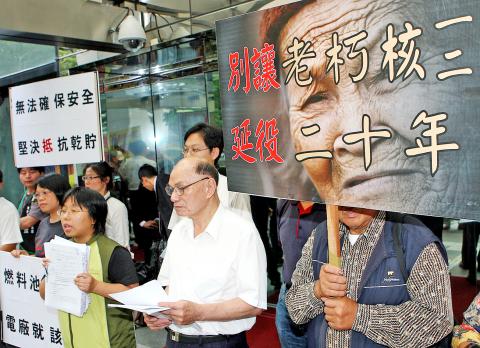A group of antinuclear activists yesterday filed a lawsuit against the Atomic Energy Council for allowing Taiwan Power Co (Taipower, 台電) to conduct heat testing at its dry cask nuclear waste storage facility.
Gathering in front of the Taipei High Administrative Court, the activists — joined by several residents living in the nation’s northern coast, where the nation’s first and second operating nuclear power plants are located — shouted slogans such as “Power plants should retire when spent fuel pool is full” and “First confirm the removal schedule or temporary storage will become the final disposal site.”
Northern Coast Antinuclear Action Alliance chief executive Kuo Ching-lin (郭慶霖) said the council — the nation’s regulatory body for nuclear power safety — gave permission to Taipower in September last year to conduct heat tests at a dry cask storage facility for spent fuel from the Jinshan Power Plant at New Taipei City’s Shihmen District (石門).

Photo: CNA
However, inserting high-level radioactive spent fuel bundles into the facility may cause great health risks to people living in the Greater Taipei and Yilan area, he said, adding that they are against such tests unless they can be proven completely safe.
Volunteer attorney for the residents and groups Tsai Ya-ying (蔡雅瀅), a lawyer at the Wild at Heart Legal Defense Association, said that while the council claims that the dry cask storage is only a “midterm” storage facility for spent fuel, the example of the so-called temporary nuclear waste repository on Lanyu (蘭嶼, also known as Orchid Island) leaves them with doubts.
She said that although the government said the Lanyu depot was a temporary storage site, the low-level nuclear waste has not been removed since the site began operation in 1982 and radioactive leaks have been detected at the site.
“The main problem is that the government cannot find a final disposal site for nuclear waste,” Tsai said, adding that the plaintiffs are worried that the dry cask storage of spent fuel will eventually become the final disposal site.
They urged the council to withdraw its approval for Taipower’s test runs. They also asked Taipower to provide nuclear waste removal plans for Lanyu and the dry cask storage facility.

AGING: As of last month, people aged 65 or older accounted for 20.06 percent of the total population and the number of couples who got married fell by 18,685 from 2024 Taiwan has surpassed South Korea as the country least willing to have children, with an annual crude birthrate of 4.62 per 1,000 people, Ministry of the Interior data showed yesterday. The nation was previously ranked the second-lowest country in terms of total fertility rate, or the average number of children a woman has in her lifetime. However, South Korea’s fertility rate began to recover from 2023, with total fertility rate rising from 0.72 and estimated to reach 0.82 to 0.85 by last year, and the crude birthrate projected at 6.7 per 1,000 people. Japan’s crude birthrate was projected to fall below six,

Conflict with Taiwan could leave China with “massive economic disruption, catastrophic military losses, significant social unrest, and devastating sanctions,” a US think tank said in a report released on Monday. The German Marshall Fund released a report titled If China Attacks Taiwan: The Consequences for China of “Minor Conflict” and “Major War” Scenarios. The report details the “massive” economic, military, social and international costs to China in the event of a minor conflict or major war with Taiwan, estimating that the Chinese People’s Liberation Army (PLA) could sustain losses of more than half of its active-duty ground forces, including 100,000 troops. Understanding Chinese

US President Donald Trump in an interview with the New York Times published on Thursday said that “it’s up to” Chinese President Xi Jinping (習近平) what China does on Taiwan, but that he would be “very unhappy” with a change in the “status quo.” “He [Xi] considers it to be a part of China, and that’s up to him what he’s going to be doing, but I’ve expressed to him that I would be very unhappy if he did that, and I don’t think he’ll do that. I hope he doesn’t do that,” Trump said. Trump made the comments in the context

SELF-DEFENSE: Tokyo has accelerated its spending goal and its defense minister said the nation needs to discuss whether it should develop nuclear-powered submarines China is ramping up objections to what it sees as Japan’s desire to acquire nuclear weapons, despite Tokyo’s longstanding renunciation of such arms, deepening another fissure in the two neighbors’ increasingly tense ties. In what appears to be a concerted effort, China’s foreign and defense ministries issued statements on Thursday condemning alleged remilitarism efforts by Tokyo. The remarks came as two of the country’s top think tanks jointly issued a 29-page report framing actions by “right-wing forces” in Japan as posing a “serious threat” to world peace. While that report did not define “right-wing forces,” the Chinese Ministry of Foreign Affairs was